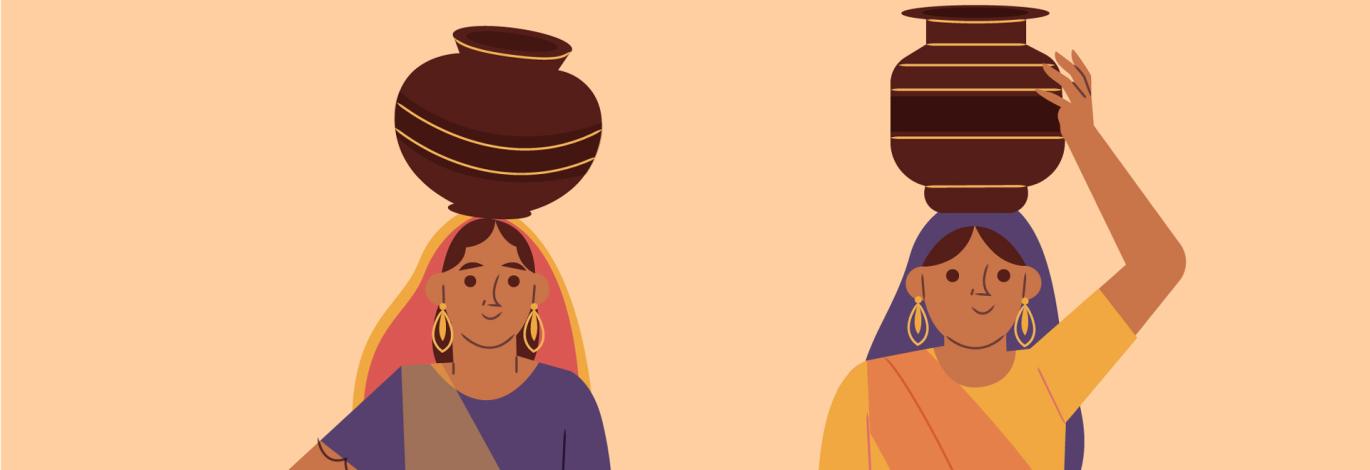
"Are the hours between men and women the same?" I inquire of Rashida Bibi.
We’re welcomed inside her house, the diligent arrangement of chairs by young boys allows our team of researchers to join the family circle and discuss their experiences in the rice fields.
"Yes," a man interjects on behalf of Rashida Bibi, his tone exuding satisfaction. "We all get paid for the same hours!"
This isn’t the entire truth. In the rice fields of Punjab, women wade through insect-infested waters, their nimble fingers tending to delicate seedlings under the scorching sun. Returning home, they assume the weight of domestic responsibilities, women stand as the unsung pillars of an industry deeply entrenched in their toil.
Like many communities in the vicinity, this community is made of up a collection of families that are employed by a local landlord paying them to work on the land. This community in particular are migrant workers, travelling from South Punjab to areas of Central Punjab such as Gujranwala and Narowal where the rice transplanting season is still active. With help from Brokers that act as an intermediately between the Waderas (landlords) and the labourers, the labourers travel to where they are needed during the hot summer transplanting season. The women accompany the men to work and to provide sustenance to the families. Women feel the double burden in capitalist and domestic production ‘with little, if any, acknowledgement of, or compensation for their role in the capitalist agrarian production process’. Women as major stakeholders lack the power to better their situation, which is often attributed to their lack of economic capital even though their value is significant. NGOs have attempted to bridge this gap through interventions seeking to empower women by imparting marketable skills and providing them with sewing machines and associated equipment. However, amidst these efforts lies a critical question - do these interventions truly pave the way for women's economic independence and growth, or do they serve as mere symbols of corporate social responsibility, leaving women confined within low-skill, traditionally female-dominated fields? And have their interventions addressed how one is to find the time to seek independence whilst the weight of the household rests on her shoulders?
Many may argue that economic value comes from capital and that the conventional understanding of capital is predominantly associated with economic resources and financial wealth. However, it should be argued that the notion of capital should extend beyond financial assets to include the invaluable contributions of caretaking, often performed by women within the framework of social reproduction.
Karl Marx introduced the idea of the social and economic reproduction of societies within a cultural structure, emphasizing the significance of various social, cultural, and economic factors in perpetuating and sustaining societal structures. Feminist Marxists such as Federici emphasise the critical role played by women in nurturing families and communities through caretaking activities, underscoring the essential yet often undervalued labour involved in caregiving and domestic responsibilities. This analysis sheds light on the broader perspective of capital, urging a recognition of the non-monetary contributions that are integral to the functioning and continuity of societies. Rashida Bibi explains how when it comes to the daals or the salaans, each woman will make it for their own family but collectively the women will make rotis for everyone to eat in the middle of the day. Women will rise early to prepare breakfast and then spend additional time after everyone’s return from the fields to prepare dinner. On average women are spending more time working then their male counterparts but their domestic and child-rearing related forms of labour has never been compensated monetarily even though great value is added to the reproduction of their community.
When asked about what the men do during this time in the evening, she laughs and says their sit on their chaarpais and talk. When asked by a researcher if she thinks this is unfair or if women should not have to bear the brunt of the domestic responsibilities, she looks at us in the fading evening light and says, “Agar hum nahi karenge, toh kon karega?” (If we don’t do it, then who will?)
Injeel Abdul Aziz is a Political Science Senior with an interest in Environmental Sciences as well as a Research Assistant at the Centre for Water Informatics and Technology.
